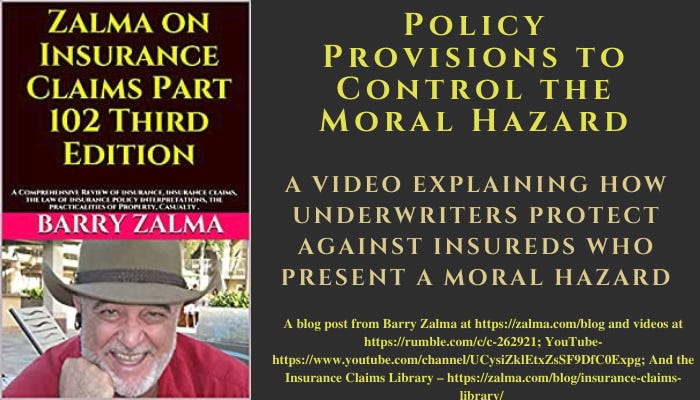A Video Explaining How Underwriters Protect Against Insureds Who Present a Moral Hazard
Policy Provisions to Control the Moral Hazard
Read the full article at https://www.linkedin.com/pulse/policy-provisions-control-moral-hazard-barry-zalma-esq-cfe and see the full video at https://rumble.com/vok4xs-a-video-explaining-how-underwriters-protect-against-insureds-who-present-a-.html and at
and at https://zalma.com/blog plus more than 3950 posts.
Policy provisions can be used to control the risk of the moral hazard, without refusing the risk in its entirety. Built-in provisions of the policies like the “fraud and misrepresentation” conditions work to deter losses by persons with a moral hazard.
The standard fire policy, and most first party policies, provide that the entire policy is void if the applicant commits fraud in securing the insurance or if the insured willfully misrepresents or conceals any material fact or circumstance concerning insurance. If the policy is a marine policy the insured is required to volunteer material information even if not asked. With other types of insurance, the onus is on the insurer to ask the right questions. Failure to ask can compel an insurer to stay on a risk it would never have taken if it knew the truth.
Cancellation:
The insurer retains the right to cancel coverage. However, recent consumer-oriented legislation has effectively eliminated this option after a policy is in effect for 60 days except for nonpayment of premium or fraud. This legislation means that pre-risk inspection and post-loss reports are even more important to the underwriter.
Prompt Reporting of A Loss:
This requirement is designed to deprive the insured of the opportunity to organize evidence to appear honest.
Settlement of loss:
The insurer retains the right to repair the damaged property.
Exclusion or special limitations:
Certain property, like money, gold, and jewelry, may be excluded or may have special limitations placed on it to limit the insurer’s exposure to a fraudulent loss.IIncrease of Hazard:
The policy provides that no coverage exists if the insured does something to increase the hazard before the loss. For example, if a tuna fish cannery, without informing its insurer, decides to change its function to the manufacture of plastic explosives and nitroglycerine, this significant increase of hazard would not be covered.
In Dynasty, Inc. v. Princeton Insurance Co., 165 N.J. 1 (N.J. 07/24/2000), the Supreme Court of New Jersey found that an insured who unjustifiably disabled a sprinkler system so increased the hazard faced by the insurer that the fire insurance coverage was suspended. It also found that the “increase-of-hazard” clause is standard language required by statute N.J.S.A. 17:36-5.20.
© 2021 – Barry Zalma
Barry Zalma, Esq., CFE, now limits his practice to service as an insurance consultant specializing in insurance coverage, insurance claims handling, insurance bad faith and insurance fraud almost equally for insurers and policyholders.
He also serves as an arbitrator or mediator for insurance related disputes. He practiced law in California for more than 44 years as an insurance coverage and claims handling lawyer and more than 54 years in the insurance business.
Subscribe to Excellence in Claims Handling at https://barryzalma.substack.com/welcome.
He is available at http://www.zalma.com and zalma@zalma.com. Mr. Zalma is the first recipient of the first annual Claims Magazine/ACE Legend Award. Over the last 53 years Barry Zalma has dedicated his life to insurance, insurance claims and the need to defeat insurance fraud. He has created the following library of books and other materials to make it possible for insurers and their claims staff to become insurance claims professionals.
Go to training available at https://claimschool.com; articles at https://zalma.substack.com, the podcast Zalma On Insurance at https://anchor.fm/barry-zalma; Follow Mr. Zalma on Twitter at https://twitter.com/bzalma; Go to Barry Zalma videos at https://www.rumble.com/zalma ; Go to Barry Zalma on YouTube- https://www.youtube.com/channel/UCysiZklEtxZsSF9DfC0Expg; Go to the Insurance Claims Library – https://zalma.com/blog/insurance-claims-library/ The last two issues of ZIFL are available at https://zalma.com/zalmas-insurance-fraud-letter-2/ podcast now available at






